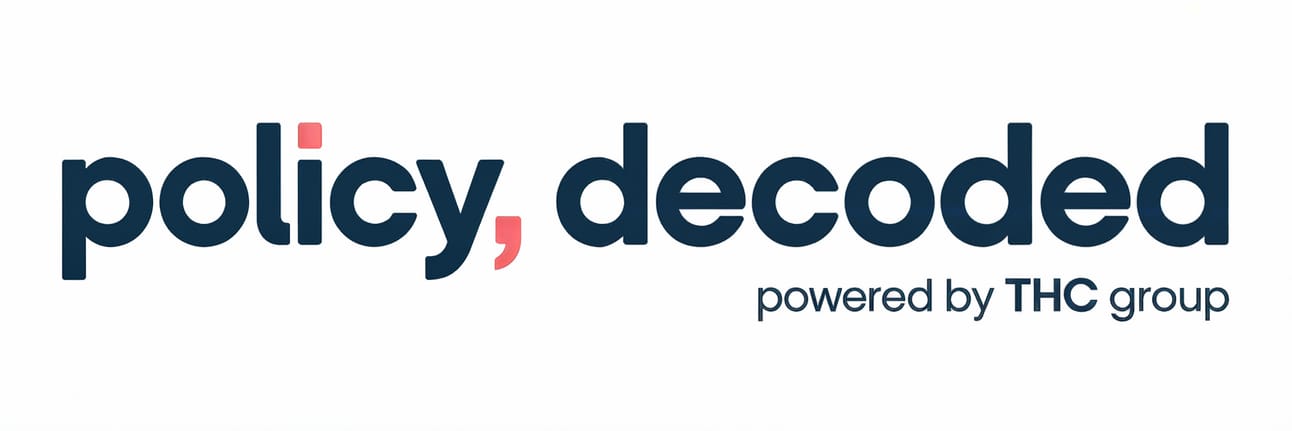Built by a former cannabis regulator, Policy, Decoded delivers no-fluff, high-signal intelligence for operators, investors, and policymakers navigating the collision of law, business, and politics.
The Congressional Cannabis Caucus ghosted its own mission. Financial stress signals are flashing from Ayr Wellness to Michigan’s collapsing margins. Massachusetts pulled a cannabis testing license. Nebraska locked in one of the most restrictive medical programs in the country. And Illinois stands as a national case study in how social equity breaks when the rules outpace the support.
The signals are loud. Compliance, enforcement, and policy risk are moving together.
☕ Read it with your morning coffee.
📈 Reference it in your strategy meeting.
📬 Forward it to your compliance lead.
Start smarter. Move faster. Stay ahead.

Start here — the day’s most important development, decoded for impact.
📌 What Happened:
The Congressional Cannabis Caucus has not held a single meeting in 2025 (Marijuana Moment). No schedules. No agendas. No updates. Not even a group photo. This is the official caucus responsible for advancing cannabis policy in Congress. I mean, it kind of checks out.
Lawmakers still manage to introduce bills, hold sporadic hearings, and send fundraising emails about cannabis reform. The one group designed to coordinate that work, though? Nah.
💡 Why It Matters:
Federal cannabis reform remains stalled because no one in Washington wants to own it. Banking, rescheduling, tax reform, and expungements continue to drift without coordination or political will. The gap between federal law and the realities on the ground keeps growing. Operators take the risk. Patients hold the uncertainty. Investors watch the door stay shut.
🧠 THC Group Take: Anyone waiting for Congress to fix cannabis should hang this update on the wall. The states are moving. The courts are moving. Congress is debating whether the “Big Beautiful Bill” can be called the “Big Beautiful Bill.”
If your strategy relied on Congress, you were destined to fail anyway. Build at the state level. Fortify in court. Pressure the agencies. Washington decided long ago this is someone else’s problem.
Watch what they do. Ignore what they say. And right now, what they are doing is nothing.

Fast-moving headlines, flagged for what matters.
Delaware will begin adult-use cannabis sales on August 1, with 13 medical dispensaries converting to recreational licenses (Spotlight Delaware). Regulators have also issued 125 total licenses across cultivation, manufacturing, retail, and testing. Many social equity licensees are still working to secure financing and real estate, so the early market favors established operators. Delaware’s rollout joins a growing list of states prioritizing speed over equity in early implementation.
Federal prosecutors are now investigating former Oregon Secretary of State Shemia Fagan over her private consulting work for cannabis companies while in office (Ganjapreneur). The Department of Justice is examining whether the arrangement violated criminal statutes around public corruption. Fagan resigned last year after reports revealed she had signed a $10,000-per-month consulting contract with cannabis licensees while overseeing election certification and ethics oversight. This is a stark reminder that regulatory capture and political risk are alive and well in cannabis policy.
Governor Jim Pillen has signed emergency regulations for Nebraska’s medical cannabis program, locking in rules that ban flower sales and impose tight limits on qualifying conditions (Nebraska Public Media). The rules reflect the state’s highly conservative approach, including restrictions on THC forms, strict product controls, and narrow patient eligibility. Nebraska’s model is shaping up as one of the most restrictive medical frameworks in the country. The message is clear. This is legalization on paper with prohibition in practice.
A group of Vermont hemp producers and craft brewers is calling on state lawmakers to support the growth of a regulated hemp-infused beverage market (VermontBiz). The Vermont Hemp & Beverage Coalition argues that clear rules and state backing could position Vermont as a leader in this fast-growing category. With craft beer sales falling and hemp beverages rising, the coalition sees this as an economic development play — one that keeps jobs, production, and tax revenue local.
MSO TerrAscend is preparing to exit the Michigan cannabis market, citing challenging economics and sustained oversupply (MJBizDaily). Michigan’s market has seen repeated price collapses, license saturation, and rising regulatory pressure. This marks another signal that even national operators are pulling back from states where the math no longer works.
Massachusetts regulators have revoked a cannabis testing laboratory license for the first time in state history, citing repeated violations that jeopardized the integrity of product safety results (MJBizDaily). The move signals aggressive enforcement in a sector that often flies under the radar but plays a critical role in the legal supply chain. Compliance failures in testing do not stay contained - they ripple through every product on the shelf.
MSO Ayr Wellness missed an interest payment on $243 million in senior notes, citing ongoing efforts to restructure its debt (Cannabis Business Times). This signals mounting financial pressure as operators across the industry face high interest rates, falling valuations, and shrinking margins. Ayr says discussions with lenders are active, but the risk signals are loud.

